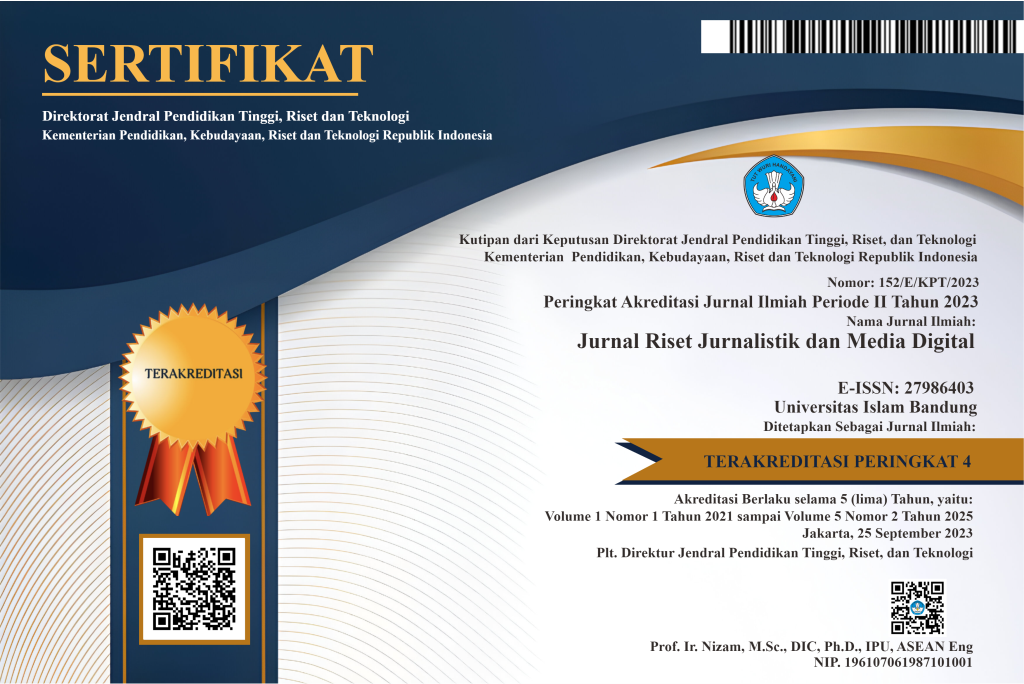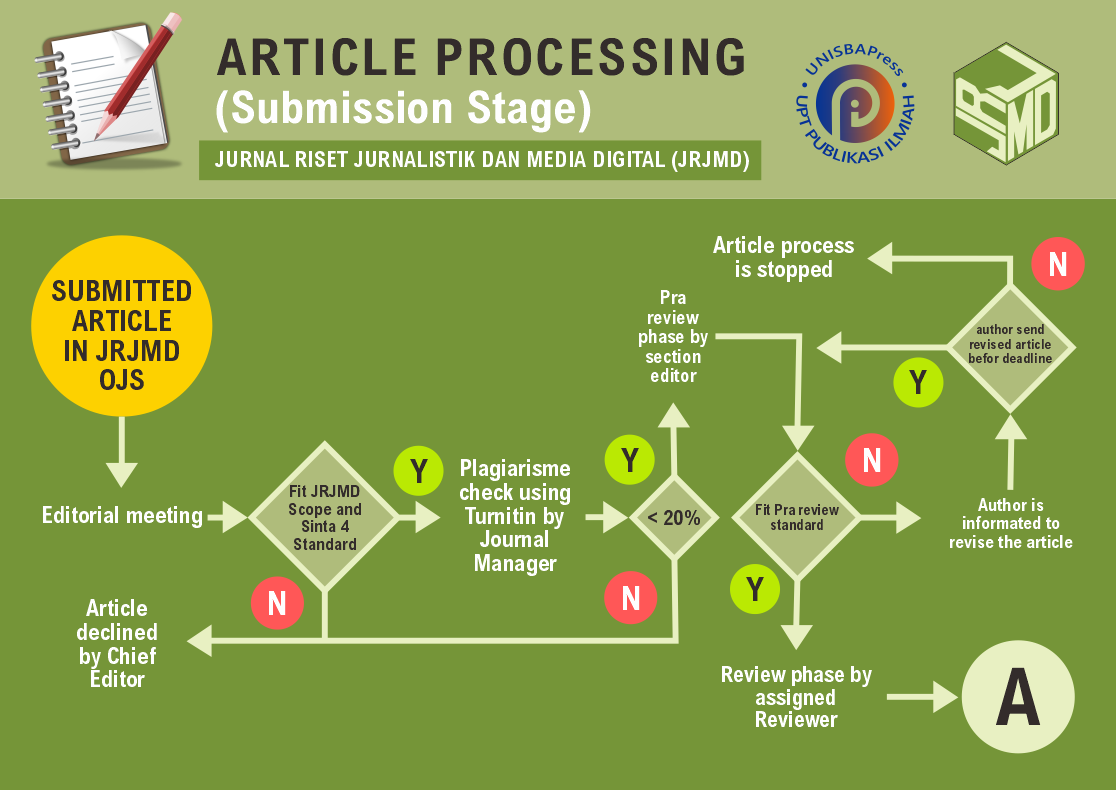Anticipatory Attitude of Millennials Towards Hoaxes
DOI:
https://doi.org/10.29313/jrjmd.v3i2.2472Keywords:
Millenials, Hoax, AnticipatoryAbstract
Abstract. Along with the rapid development of technology, the more advanced process of disseminating information. Hoax is one of the problems related to the dissemination of information. Hoax is fake news created by irresponsible people, made in such a way as to trick the readers into believing the word. The circulation of hoaxes is a concern for anyone, because of the disturbing nature of hoaxes, causing panic and other negative things. An anticipatory attitude towards hoaxes is very necessary. This study focuses on anticipatory attitudes towards hoaxes in the millennial generation. Where the millennial generation is a generation that is sensitive and active toward technological developments. So, hoax makers make them targets to read and disseminate hoax news. This study aims to determine whether the current millennial generation has implemented an anticipatory attitude toward hoaxes properly. The data collection technique was carried out with a questionnaire containing questions about anticipatory attitudes toward hoaxes that needed to be done. This research produces data that shows that the current millennial generation is quite aware of the anticipatory attitude toward hoaxes that must be done. Along with the rapid development of technology, the more advanced process of disseminating information. Hoax is one of the problems related to the dissemination of information. Hoax is fake news created by irresponsible people, made in such a way as to trick the readers into believing the word. The circulation of hoaxes is a concern for anyone, because of the disturbing nature of hoaxes, causing panic and other negative things. An anticipatory attitude towards hoaxes is very necessary. This study focuses on anticipatory attitudes towards hoaxes in the millennial generation. Where the millennial generation is a generation that is sensitive and active toward technological developments. So, hoax makers make them targets to read and disseminate hoax news. This study aims to determine whether the current millennial generation has implemented an anticipatory attitude toward hoaxes properly. The data collection technique was carried out with a questionnaire containing questions about anticipatory attitudes toward hoaxes that needed to be done. This research produces data that shows that the current millennial generation is quite aware of the anticipatory attitude toward hoaxes that must be done.
Abstrak. Seiring dengan lajunya perkembangan teknologi, maka semakin maju penyebaran suatu informasi saat ini. Hoax adalah salah satu masalah terkait penyebaran informasi. Hoax merupakan berita bohong yang dibuat oleh oknum tidak bertanggungjawab, dibuat sedemikian rupa untuk mengelabui para pembaca agar mempercayai berita tersebut. Beredarnya hoax menjadi perhatian bagi siapapun, karena sifat hoax yang meresahkan, menimbulkan kepanikan dan hal negatif lainnya. Sikap antisipatif terhadap hoax sangat diperlukan. Penelitian ini berfokus pada sikap antisipatif terhadap hoax pada generasi milenial. Dimana generasi milenial merupakan generasi yang peka dan aktif terhadap perkembangan teknologi, sehingga para pembuat hoax menjadikan mereka sasaran untuk membaca dan menyebarluaskan berita hoax. Penelitian ini bertujuan untuk mengetahui apakah generasi milenial saat ini sudah menerapkan sikap antisipasi terhadap hoax dengan baik. Teknik pengumpulan data dilakukan dengan kuesioner yang berisikan pertanyaan-pertanyaan seputar sikap antisipatif terhadap hoax yang perlu dilakukan. Penelitian ini menghasilkan data-data yang menunjukkan bahwa generasi milenial saat ini sudah cukup paham tentang sikap antisipatif terhadap hoax yang harus dilakukan.
References
Abdussalam, M. R., and F. Alamsyah. 2021. The Importance of Literacy to Avoid Indonesian Younger from Hoaxes Spread. Engaging Youth in Community Development to Strengthen Nation’s Welfare.
Amelia Rahmi, and Qorby Haqqul Adam. 2022. “Peran Aktivis Pers Mahasiswa Jawa Tengah Dalam Meluaskan Internet Damai.” Jurnal Riset Jurnalistik Dan Media Digital 2(2):91–98. doi: 10.29313/jrjmd.v2i2.1357.
Batoebara, et al. 2021. “Literasi Media Dalam Menanggulangi Berita Hoaks (Studi Pada Siswa SMKN 5 Medan).” Jurnal Warta Edisi 63(14):34–41.
Cantika, A. D. 2020. “Millennial Generation Has Vital Role in Facing Hoaxes. UNAIR News.” Retrieved (https://news.unair.ac.id/2020/09/10/millennial-generation-has-vital-role-in-facing-hoaxes/?lang=en).
D Daud, R. F., and K. Khairunnisa. 2022. “Young Generation and Hoax Danger in The Middle of The Community International Journal of Engineering. Science and Information Technology.” 2(3):52–57. doi: https://doi.org/10.52088/ijesty.v213.287.
Dasdar, Jufadli Rachmad, and Yadi
Supriadi. 2023. “Literasi Digital Dalam Menanggulangi Perundungan Siber Di Dunia Olahraga.” Jurnal Riset Jurnalistik Dan Media Digital 3(1):31–38.
Ibad, M. N. 2019. “No TitleModel Pembelajaran Komunikasi Pada Penggunaan Sosial Media Untuk Menanggulangi Penyebaran Berita Hoax Bagi Generasi Muslim Milenial.” Wasilatuna: Jurnal Komunikasi Dan Penyiaran Islam 2(1):53–73.
Judith, C. 2018. “Interaksi Komunikasi Hoax Di Media Sosial Serta Antisipasinya. Journal Pekomnas.” 3(1):31–34.
MS, D., and D. Novitasari. 2022. “Literasi Digital Bagi Remaja Dan Karang Taruna Dalam Upaya Mencegah Informasi Hoax Di Desa Sukaraja Kecamatan Lengkiti Kabupaten Ogan Komering Ulu. Wahana Dedikasi.” Jurnal PkM Ilmu Kependidikan 5(2):178. doi: https://doi.org/10.31851/dedikasi.v5i2.7536.
Nurrahmi, F., and H. M. Syam. 2020. “Perilaku Informasi Mahasiswa Dan Hoaks Di Media Sosial. Communicatus.” Jurnal Ilmu Komunikasi 4(2):129–46. doi: https://doi.org/10.15575/cjik.v412.9215.
Remaja, I. N., and D. M. J. G., Ardana. 2020. “Pengamanan Informasi Dalam Rangka Mengawal Generasi Milenial Tolak Ancaman Berita Hoax.” Jurnal Jnana Karya 1(1):37–45.
Slamet, Muhamad Rifqi, and Tia Muthiah Umar. 2023. “Persepsi Mahasiswa Bandung Pada Konten Podcast Deddy Corbuzier.” Jurnal Riset Jurnalistik Dan Media Digital 3(1):13–18.
Tesa Gita Rinanda, and Fatmawati Moekahar. 2022. “Remaja Dan Literasi Media Sosial.” Jurnal Riset Jurnalistik Dan Media Digital 2(2):71–76. doi: 10.29313/jrjmd.v2i2.1076.














